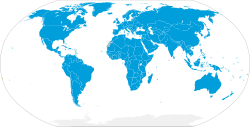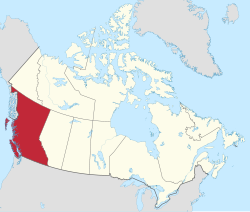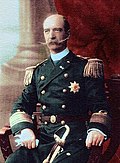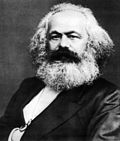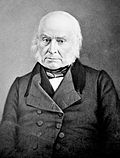Portal:Politics
| Main | Topics and categories | Tasks and projects |
The Politics portal
Politics (from Ancient Greek πολιτικά (politiká) 'affairs of the cities') is the set of activities that are associated with making decisions in groups, or other forms of power relations among individuals, such as the distribution of status or resources. The branch of social science that studies politics and government is referred to as political science.
Politics may be used positively in the context of a "political solution" which is compromising and non-violent, or descriptively as "the art or science of government", but the word often also carries a negative connotation. The concept has been defined in various ways, and different approaches have fundamentally differing views on whether it should be used extensively or in a limited way, empirically or normatively, and on whether conflict or co-operation is more essential to it.
A variety of methods are deployed in politics, which include promoting one's own political views among people, negotiation with other political subjects, making laws, and exercising internal and external force, including warfare against adversaries. Politics is exercised on a wide range of social levels, from clans and tribes of traditional societies, through modern local governments, companies and institutions up to sovereign states, to the international level.
In modern states, people often form political parties to represent their ideas. Members of a party often agree to take the same position on many issues and agree to support the same changes to law and the same leaders. An election is usually a competition between different parties.
A political system is a framework which defines acceptable political methods within a society. The history of political thought can be traced back to early antiquity, with seminal works such as Plato's Republic, Aristotle's Politics, Confucius's political manuscripts and Chanakya's Arthashastra. (Full article...)
Selected article
The Political Cesspool is a weekly talk radio show founded by James Edwards, and syndicated by Liberty News Radio Network and Accent Radio Network. First broadcast in October 2004 twice a week from radio station WMQM, it is broadcast on Saturday nights on WLRM, a Christian radio station in Millington, Tennessee. Its sponsors include the white separatist Council of Conservative Citizens and the Institute for Historical Review, a Holocaust denial group. According to its statement of principles, the show stands for the "Dispossessed Majority" and represents "a philosophy that is pro-White." It has attracted criticism from multiple organizations for its promotion of anti-semitic, white nationalist and white supremacist views. The show features Edwards and his co-hosts Bill Rolen, Winston Smith, Keith Alexander, and Eddie Miller, as well as producer Art Frith. Its guests have included author Jerome Corsi, Minuteman Project leader Jim Gilchrist, former Constitution Party presidential candidate Michael Peroutka, actor Sonny Landham, British National Party leader Nick Griffin, Vermont secessionist Thomas Naylor, and paleoconservative activist Pat Buchanan.
Featured picture

David Ben-Gurion (born David Grün; 16 October 1886 – 1 December 1973) was the primary national founder of the State of Israel and the first Prime Minister of Israel. Adopting the name of Ben-Gurion in 1909, he rose to become the preeminent leader of the Jewish community in British-ruled Mandatory Palestine from 1935 until the establishment of the State of Israel in 1948, which he led until 1963 with a short break in 1954–55.
Selected quote
Selected biography
George I of Greece was King of Greece from 1863 to 1913. Originally a Danish prince, when only 17 years old he was elected King by the Greek National Assembly, which had deposed the former King Otto. His nomination was suggested and supported by the three Great Powers (United Kingdom of Great Britain and Ireland, Second French Empire and the Russian Empire). As the first monarch of the new Greek dynasty, his 50-year reign (the longest in modern Greek history) was characterized by territorial gains as Greece established its place in pre-World War I Europe. Two weeks short of the fiftieth anniversary of his accession, and during the First Balkan War, he was assassinated. In sharp contrast to his reign, the reigns of his successors would prove short and insecure.
Did you know (auto-generated) -

- ... that Kit Nascimento, a spokesperson for the government of Guyana during the aftermath of Jonestown, disagrees with current proposals to open the former Jonestown site as a tourist attraction?
- ... that in the 1916 Declaration of Sainte-Adresse Britain, France and Russia committed to securing the political and economic independence of Belgium after the First World War?
- ... that Laurence Sterne was told to burn all copies of his pamphlet that depicts his patron's rival with a toilet on his head?
- ... that Bradley Smalley, the political boss of the Vermont Democratic Party, once received the Republican nomination for alderman?
- ... that Crossing a Line compares Palestinian political expression on either side of the Green Line between Israel and the occupied Palestinian territories?
- ... that Rabab Al-Kadhimi was threatened with deportation from Egypt due to the political nature of her poetry?
More did you know...
- ...that the Japanese Farmer-Labour Party was banned just a few hours after its foundation in 1925?
- ...that Glenn Beck introduced a "Black-Robed Regiment" of pastors from various denominations during his Restoring Honor rally in 2010, and launched a news website called The Blaze three days later?
- ...that the book Targeted Killing in International Law argues support in the Western world for targeted killing increased following the September 11 attacks?
- ...that Mussolini's Quota 90 fixed the lira exchange rate against the pound sterling at the prevailing rate from five years earlier, when he assumed power?
- ...that the energy lobby contributed 19 million dollars to United States political campaigns in the 2006 election cycle?
- ...that the lifelong Democrat Jim Naugle is in his sixth straight term as the Mayor of Fort Lauderdale and supported only Republicans for President since 1968?
- ...that Chinese Taipei is the designated name the Republic of China (Taiwan) uses in most international organizations?
- ...that Roman embassies to China are reported in Chinese historical accounts from as early as 166?
In this month
- May 5, 2005 – A General Election in the United Kingdom sees Tony Blair's Labour government returned to office with a reduced majority of 66.
- May 14, 1948 – The Declaration of Independence of Israel is made.
- May 18, 1948 – The first Legislative Yuan of the Republic of China officially convenes in Nanking.
News and Current events
- August 11: 4 local government areas in New South Wales, Australia locked down after COVID-19 case
- August 11: Australia: AstraZeneca vaccine access expanded by Victorian government
- August 1: Australia: Victorian lockdown lifted
- July 29: Tunisia's president dismisses prime minister, suspends parliament
- July 25: Australia: Wikinews interviews Reg Kidd, mayor of the City of Orange, about COVID-19 lockdown and local government
- July 23: South Australia enters week-long lockdown to contain COVID-19 Delta variant spread
- July 21: Technological University Dublin senior lecturer Dr Lorcan Sirr speaks to Wikinews on housing market in Ireland
- July 21: Three rural councils in New South Wales, Australia enter 7-day lockdown
- July 21: Australia: Victoria lockdown extended by a week with 85 active cases recorded
- July 15: California governor signs new state budget, eligible Californians to get stimulus payments
Topics and categories
General images
Related portals
Associated Wikimedia
The following Wikimedia Foundation sister projects provide more on this subject:
-
 Commons
Commons
Free media repository -
 Wikibooks
Wikibooks
Free textbooks and manuals -
 Wikidata
Wikidata
Free knowledge base -
 Wikinews
Wikinews
Free-content news -
 Wikiquote
Wikiquote
Collection of quotations -
 Wikisource
Wikisource
Free-content library -
 Wikiversity
Wikiversity
Free learning tools -
 Wiktionary
Wiktionary
Dictionary and thesaurus




